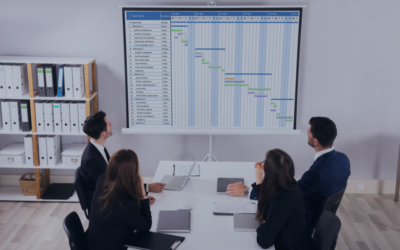For businesses, enterprise resource planning (ERP) software solutions are an essential part of maintaining consistency and efficiency in all operations. This type of software is a comprehensive tool for automating and organizing data and business processes, including financials, reporting, human resources, the supply chain, and much more. It is an all-in-one platform that allows businesses to keep track of everything in one place.
If your business is looking for an ERP, you probably already know that there are two popular pricing models: SaaS and perpetual. Before you buy an ERP solution, it is vital to weigh the benefits of perpetual ERP vs SaaS. Choosing the wrong one could break the budget or cause data security issues that could spell disaster for a company. This article will examine SaaS and perpetual ERP licenses, their benefits, drawbacks, and what you should consider before deciding between them.
What is a SaaS ERP License?
The first of the two types of licenses is the (Software-as-a-Service) SaaS ERP license. Common among cloud ERP systems, this is a license for which you pay a subscription fee, much like you would for a magazine or a video streaming service.
With cloud-based ERP software that uses the SaaS model, the ERP vendor hosts the platform, and users access it online. This means you do not need to build or possess any IT infrastructure. The software vendors take care of all the maintenance and updates, so you always have access to the latest version. The cost for these services is included in the subscription price.
The Benefits of SaaS ERP Licenses
There are several benefits to choosing the SaaS ERP licensing model, including its scalability, lower upfront costs, and automatic updates.
Scalability
With SaaS licenses, businesses can easily scale up as needed. Because they pay for the software every month, you can choose the pricing plan that works best for your business in the short term and then upgrade to the next level as your business expands.
ERP implementation is a bit simpler with SaaS ERP systems because they don’t require expensive infrastructure.
Lower Upfront Costs
Another benefit of SaaS licenses is that they have lower upfront costs than perpetual licenses. Not only can you choose a pricing plan that fits your business’s budget, but you also don’t have to pay for hardware, data centers, IT staff, resilience, or security measures. The software supplier works those things into the subscription price and handles them.
Automatic Updates
Lastly, since the vendor hosts the software, SaaS ERP licenses provide businesses with access to automatic software updates. The updates are part of the subscription price, and your business is less likely to experience downtime during them. SaaS ERP systems will also usually come with 24-hour support.
The Potential Drawbacks of SaaS ERP Licenses
As with anything in business, there are a few drawbacks to choosing a SaaS ERP license, including the lack of control over updates and potential data security concerns. Whether these drawbacks are strong enough to make you choose a on premise solution with a perpetual license instead will depend on the needs of your business.
Lack of Control Over Updates
One of the very things that makes a SaaS ERP license beneficial can also be one of its drawbacks–updates are controlled by the vendor and not your IT staff. This means that the vendor could roll certain updates out for the ERP system that you do not want, and the updates could affect the other platforms your business uses.
Data Security Concerns
Secondly, SaaS ERP systems can come with potential data security concerns. Most vendors will provide security measures, like audits, certifications, notifications of data breaches, or cyber-attack insurance. But, if they do not, this can be an issue.
Also, since it does not store the data at your business’s data center, you will want to ensure there is a way to back it up periodically so you have it if there is ever a breach or a time when you can’t access it.
What is a Perpetual ERP License?
The second type of license is the perpetual ERP license. Unlike SaaS licenses, you pay for perpetual licenses at once, in one lump sum payment. When you purchase an ERP perpetual license, you own the software forever.
The Benefits of Perpetual ERP Licenses
Perpetual ERP licenses have a couple of advantages over SaaS licenses, such as greater control over updates and the potential for lower long-term costs.
Greater Control Over Updates
Rather than risking what happens when a system updates unexpectedly, as can happen with SaaS ERP software, a perpetual license buys you the current version of the software and will not update automatically. This provides you with the assurance that the software won’t change just because the provider wants to update something. However, most times, if you pay for a support contract, you can have access to updates when you are ready.
Potential for Lower Long-Term Costs
Additionally, a perpetual ERP license has the potential for lower long-term costs. If you use the software for a long period, the total cost of ownership will be less over time because you will already have the upfront costs taken care of.
The Drawbacks of Perpetual ERP Licenses
Like SaaS licenses, perpetual ERP licenses also have some drawbacks, including higher upfront costs and the need for in-house IT support.
Higher Upfront Costs
Unlike SaaS ERP systems, which are hosted by the provider, perpetual ERP software licenses are hosted in-house and therefore require some upfront costs, such as hardware and other IT infrastructure elements. These costs can be extensive when starting out, but once they are in place, they rarely require much maintenance.
Requires In-House IT Support
Likewise, perpetual licenses do not come with support. This means that you will need to either hire in-house IT support, an outside consultant, or purchase a support contract.
Factors to Consider
Before deciding between a SaaS and a perpetual ERP license, you will want to consider the following factors:
- Budget: Can your business afford the upfront costs of a perpetual license, or would it be best to use the subscription model of the SaaS license? Is scalability a factor you will require?
- Business Size: How large is your business? If your business is extensive, do you need to house data locally? If your business is small, do you have the funds necessary to build and maintain the infrastructure for a perpetual license?
- IT Resources: Are you interested in hiring IT staff for your business? Would you rather have IT support as part of your ERP license? Are you interested in building IT infrastructure?
Which ERP License is Right for Your Business?
While both SaaS and perpetual ERP licenses have their benefits and drawbacks, choosing between the two is going to depend on the needs of your individual business. Do you still have unanswered questions? Want personalized advice on which ERP licensing option is best for your business? Schedule your one-on-one consultation with our expert team today!



